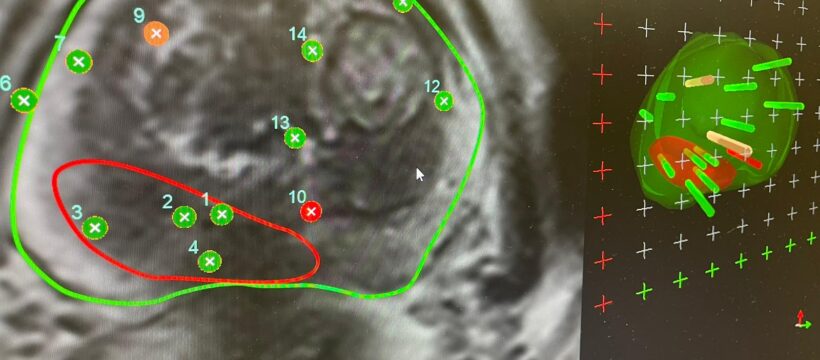A study from Karl Landsteiner University of Health Sciences demonstrates that treatment with focused ultrasound (HIFU) effectively controls prostate cancer and maintains patients’ quality of life.
Krems, Austria, 18. November 2025. A multicenter clinical study in Austria has shown that a new, highly precise ultrasound approach can successfully target and treat early prostate cancer while preserving patients’ quality of life. Tumor control was achieved in most participants, with urinary function (micturition) and sexual function largely maintained. Conducted at three hospitals under the coordination of Karl Landsteiner University of Health Sciences (KL Krems), this was the first prospective, multicenter study in Austria to evaluate the efficacy of this organ-preserving approach. The findings point toward a promising alternative to whole-gland surgery or radiotherapy for selected patients.
Prostate cancer is among the most common malignancies in men. Standard whole-gland treatments such as radical prostatectomy or radiotherapy can effectively remove the tumor but often lead to micturition problems or erectile dysfunction. The so-called focal therapy takes a different approach: it destroys only the affected part of the prostate while leaving the rest intact. In high-intensity focused ultrasound therapy, the tumor is heated and ablated under MRI and real-time ultrasound guidance with millimeter precision. Until now, this method has been considered experimental according to the European Association of Urology, mainly because prospective data were lacking. The current study from KL Krems and its clinical partners in St. Pölten, Baden, and Korneuburg provides the necessary evidence to support this therapeutic concept.
Tailored Cancer Treatment
“Instead of removing or irradiating the entire gland, we treat only the diseased part, guided by MRI and real-time ultrasound,” explain Dr. Gábor Rosta and Prof. Dr. Harun Fajkovic from the Division of Urology and Andrology at the University Hospital St. Pölten, a teaching and research center of KL Krems. “Our results show that this focused approach can effectively control cancer in selected patients while significantly reducing the side effects of conventional treatments.”
In this prospective phase II feasibility trial, 51 men with newly diagnosed, localized prostate cancer of low or intermediate risk (tumor marker PSA ≤ 15 ng/mL, stage ≤ T2) were treated between 2021 and 2024. Each underwent MRI-guided, lesion-specific HIFU ablation. Participants were monitored for two years, with quarterly PSA testing, MRI scans at 12 and 24 months, and follow-up biopsies.
After two years, more than 94% of patients required no additional therapy. In control biopsies one year after the procedure, more than 80% showed no viable tumor tissue. PSA levels dropped by 69% after three months and remained stable throughout follow-up. Adverse events were mild and transient: about one-fifth of patients experienced temporary obstructive and irritative urinary symptoms, and no severe complications were observed.
All Systems Up and Running
Functional and reported quality-of-life outcomes were equally encouraging. Erectile function, assessed via the five-item International Index of Erectile Function (IIEF-5), initially dipped slightly but fully recovered within 6–12 months — and exceeded baseline levels after two years. Men who started treatment with good micturition maintained it, while those with pre-existing voiding problems experienced marked improvement. Overall, health-related quality-of-life scores (SF-36) remained stable across all domains.
These findings confirm and extend earlier single-center data from Europe and North America but represent the first coordinated evaluation of focal HIFU within Austria’s hospital system. The authors emphasize that focused ultrasound can be safely integrated into clinical routine with careful patient selection and precise execution. They also highlight the need for longer follow-up and randomized trials before the method can enter official guidelines. Nevertheless, the results point toward a paradigm shift — toward organ-preserving tumor therapies that allow many men to safely de-escalate treatment.
The study also reflects KL Krems’s research mission to improve human health through interdisciplinary approaches, particularly in oncology and clinically applied innovation, and to advance the vision of “Personalized Medicine“.
Original publication: Focal Therapy Using High-Intensity Focused Ultrasound for Low- and Intermediate-Risk Prostate Cancer: Results from a Prospective, Multicenter Feasibility Trial. Rosta G.; Turba S.; Mun D-H.; Shehab A.; Saciri L.; Engelhardt P.F.; Weisz P.; Riedl C.; Ameli G.; Doblhammer S. & Fajkovic H. Cancers 2025, 17, 3429. DOI 10.3390/cancers17213429. https://kris.kl.ac.at/de/publications/focal-therapy-using-high-intensity-focused-ultrasound-for-low-and/
More on KL Krems research: https://www.kl.ac.at/en/research/research-blog
Karl Landsteiner University (11/2025)
The Karl Landsteiner University (KL Krems) is an internationally recognized educational and research institution located on the Campus Krems. KL Krems offers modern, demand-oriented education and continuing education in medicine and psychology as well as a PhD programme in Mental Health and Neuroscience. The flexible educational programme is tailored to the needs of students, the requirements of the labour market and the challenges of science. The three university hospitals in Krems, St. Pölten and Tulln and the MedAustron Ion Therapy and Research Centre in Wiener Neustadt guarantee clinical teaching and research of the highest quality. In its research, KL Krems focuses on interdisciplinary fields with high relevance to health policy – including mental health and neuroscience, molecular oncology as well as the topic of water quality and the associated health aspects. KL Krems was founded in 2013 and accredited by the Austrian Agency for Quality Assurance and Accreditation (AQ Austria).
Scientific Contact
Prim. Assoc. Prof. Priv. Doz. Dr. Harun Fajkovic
Division of Urology and Andrology
University Hospital St. Pölten
Karl Landsteiner University of Health Sciences
Dr.-Karl-Dorrek-Straße 30
3500 Krems / Austria
E harun.fajkovic@stpoelten.lknoe.at
Karl Landsteiner University of Health Sciences
Mag. Selma Vrazalica, BA
Communication, PR & Marketing
Dr.-Karl-Dorrek-Straße 30
3500 Krems / Austria
T +43 2732 72090 237
M +43 664 883 99 603
Copy Editing & Distribution
PR&D – Public Relations for Research & Education
Dr. Barbara Bauder-Jelitto
Kollersteig 68
3400 Klosterneuburg / Austria
M +43 664 1576 350
E bauder@prd.at
L https://www.linkedin.com/company/prd-public-relations-für-forschung-bildung

